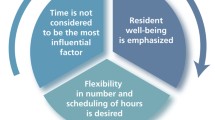Abstract
Objective
Although significant attention has been paid to the number of hours worked by residents, little consideration has been given to how the hours are assigned. This project describes an alternative to having Chief Residents manually create on-call schedules. In order to enhance objectivity and transparency, reduce perceived inequities in the process, and reduce inter-resident conflict, Harvard South Shore Psychiatry Residency Training Program experimented with a computer-generated on-call schedule.
Method
A locally written MATLAB script generated an on-call schedule for academic year (AY) 2012–2013. Measurements to assess the manual scheduling method (from AY 2011–2012) and the computer-generated method included the balance in the total number of hours assigned to individual residents; the number of call switches over two six-month periods; and survey of the residents’ perception of fairness of the two scheduling methods and preferences.
Results
A retrospective analysis of the AY 2011–2012 Chief Resident-generated call schedule found a range of differences of up to 25.8 % between total hours assigned to individual residents in a given year. In the AY 2012–2013 computer-generated schedule, the differences in total hours assigned were reduced to a maximum of 6.1 %. There were 63 % fewer call switches resulting from the computer-generated as compared to the Chief Resident-generated method. Resident survey response rate was 76 %. Seventy-seven percent of resident respondents (N = 22) perceived the computer-generated method to be fairer, and 90.9 % of residents preferred having a summary table of hours of call per resident. Residents perceived the computer-generated method as resulting in less inter-resident conflict.
Conclusion
Methods for assigning duty hour schedules that are transparent, equitable, and require less Chief involvement may result in perceptions of greater fairness and less inter-resident conflict.
Similar content being viewed by others
References
Roth AE. The evolution of the labor market for medical interns and residents: a case study in game theory. J Polit Econ. 1984;92(6):991–1016.
2012 Physician Specialty Data Book. Association of American Medical Colleges, 2012.
Nuckols TK, Bhattacharya J, Wolman DM, Ulmer C, Escarce JJ. Cost implications of reduced work hours and workloads for resident physicians. N Engl J Med. 2009;360(21):2202–15.
Fletcher KE, Underwood 3rd W, Davis SQ, Mangrulkar RS, McMahon Jr LF, Saint S. Effects of work hour reduction on residents’ lives: a systematic review. JAMA: J Am Med Assoc. 2005;294(9):1088–100.
Papp KK, Stoller EP, Sage P, Aikens JE, Owens J, Avidan A, et al. The effects of sleep loss and fatigue on resident-physicians: a multi-institutional, mixed-method study. Acad Med: J Assoc Am Med Coll. 2004;79(5):394–406.
Nasca TJ, Day SH, Amis Jr ES. The new recommendations on duty hours from the ACGME task force. N Engl J Med. 2010;363(2):e3.
Volpp KG. A delicate balance: physician work hours, patient safety, and organizational efficiency. Circulation. 2008;117(20):2580–2.
Kesselheim JC, Cassel CK. Service: an essential component of graduate medical education. N Engl J Med. 2013;368(6):500–1.
Auger KA, Landrigan CP, del Rey Gonzalez JA, Sieplinga KR, Sucharew HJ, Simmons JM. Better rested, but more stressed? Evidence of the effects of resident work hour restrictions. Acad Pediatr. 2012;12(4):335–43.
Drolet B, Khokhar M, Fischer S. The 2011 duty-hour requirements—a survey of program directors. NEJM. 2013;368(8):694–7.
Cooke BK, Cooke EO, Sharfstein SS. Evaluating the workload of on-call psychiatry residents: which activities are associated with sleep loss? Acad Psychiatr: J Am Assoc Dir Psychiatr Residency Train Assoc Acad Psychiatr. 2012;36(1):43–6.
Antiel RM, Reed DA, Van Arendonk KJ, Wightman SC, Hall DE, Porterfield JR, et al. Effects of duty hour restrictions on core competencies, education, quality of life, and burnout among general surgery interns. JAMA Surg. 2013;148(5):448–55.
McCoy CP, Halvorsen AJ, Loftus CG, McDonald FS, Oxentenko AS. Effect of 16-hour duty periods on patient care and resident education. Mayo Clin Proc Mayo Clin. 2011;86(3):192–6.
Burke L, Moore J. The reverberating effects of job rotation: a theoretical exploration of nonrotater’s fairness perceptions. Hum Resour Manag Rev. 2000;10(2):127–52.
van Dierendonck D, Schaufeli WB, Buunk BP. Burnout and inequity among human service professionals: a longitudinal study. J Occup Health Psychol. 2001;6(1):43–52.
Wallace JE, Lemaire J. On physician well being-you’ll get by with a little help from your friends. Soc Sci Med. 2007;64(12):2565–77.
Taris TW, Peeters MC, Le Blanc PM, Schreurs PJ, Schaufeli WB. From inequity to burnout: the role of job stress. J Occup Health Psychol. 2001;6(4):303–23.
Thomas NK. Resident burnout. JAMA: J Am Med Assoc. 2004;292(23):2880–9.
Cohen JS, Patten S. Well-being in residency training: a survey examining resident physician satisfaction both within and outside of residency training and mental health in Alberta. BMC Med Educ. 2005;5:21.
Ratanawongsa N, Wright SM, Carrese JA. Well-being in residency: effects on relationships with patients, interactions with colleagues, performance, and motivation. Patient Educ Couns. 2008;72(2):194–200.
Disclosure
Drs. Dickey and Panych have no competing interests to disclose.
Author information
Authors and Affiliations
Corresponding author
Rights and permissions
About this article
Cite this article
Dickey, C.C., Tarnavsky, T., Khan, I. et al. Decreasing Inter-resident Conflict by Using Computer-generated On-call Schedules. Acad Psychiatry 38, 213–216 (2014). https://doi.org/10.1007/s40596-014-0060-8
Received:
Accepted:
Published:
Issue Date:
DOI: https://doi.org/10.1007/s40596-014-0060-8




